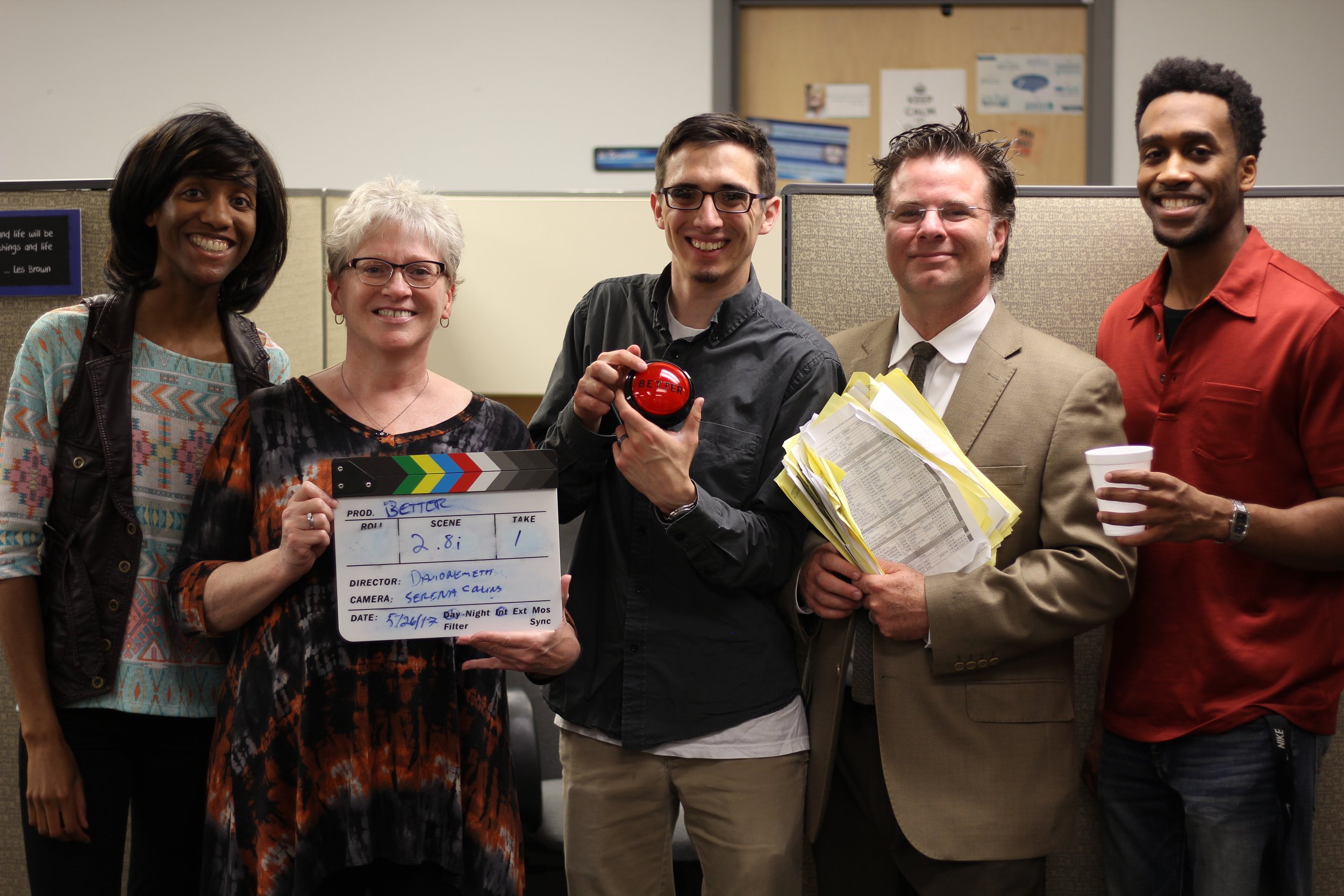Lesson Learned: “Better”
As you have probably guessed by now, I am a filmmaker, but even more so, I am a story teller. Now, I am not the greatest, nor do I claim to be, but I love sharing stories, true or fiction, but my passion lies in fiction. Fiction gives so many great opportunities to look at life through the lens of a completely controllable situation - one that my crew and I have created and devised.
In this and some posts to follow, I want to take some time and break down a few things I've learned from each of my projects, starting with the most recent film "Better."
"Better" is somewhat of an enigma to me, as the script was written as an afterthought following an arduous and weighty 20+ page script of which I was very proud, at least at the time. I thought that that long, heavy script would be the one and the short, page-and-a-half script that became "Better" would surely never see the light of day. I just had to get it out of my head. However, with constraints on budget and timing, the long script could just not feasibly be produced anytime soon. Enter "Better," the story of a down-on-his-luck office worker who finds a strange button that seemingly changes his world for the better. If you haven't seen the film yet, you probably should, since that's what this post is about, so watch it now (or after you read this post). After you’ve watched the film, you can read what I learned throughout this process below.
1. Write What You Enjoy
I just wanted to write something that made me smile.
This script made me happy, point blank. It was born out of a desire to write a new script, something I hadn't written before. Comedy is not my forte, and while this isn't a strict comedy, it has the light-heartedness and occasional humor of a comedy, thanks mostly to my amazing actor Darrin Crow. But when I was writing this script, I wasn't concerned with how I was going to film it, what others would think about my script, or even if it would make me money, but I just wanted to write something that made me smile. So I did. That's all there was to it. Now, there were a few tweaks here and there that could have been made to make it a better film, I am aware of that, but there is always room for improvement. I made the film I set out to make and it appears to you very similarly to how I envisioned it when I wrote it. Granted, better equipment and more time would have garnished a much more polished product, but I still can't help but smile as Darrin Crow's character leaps down the hall to change the world. Now, this film didn't come without its opposition, some saying that it wouldn't work, others telling me I should change most of the script, and others attacking my stature as a writer/director. Which leads me to lesson two.
2. Stick to Your Guns
I didn't accept every critique just because it was a critique.
Early in the drafting process, I brought in some people to table read the script with me so I could get a feel for how it would play out. Ironically, as it was all narration, actor Darrin Crow was the one to read it out loud, not knowing then that I would later cast him in that role. After the reading, some excellent and well-received critique was given, but I had to make sure that I didn't accept every critique just because it was a critique. Now, don't lose me here, because you definitely need to listen to all critiques and ponder them, but ultimately, you have to decide what's best for your film and the story you want to tell. Some of the critiques were excellent ideas, but ideas that I knew would distract from the purpose of the film, or change it entirely. So while I took some of their critiques and used them to better the script, some I had to deny simply because they weren't right for the film. Same goes for during filming. On set, a few people had ideas about what might make the film better, but while some ideas definitely did, others would have distracted from or changed the story. Know the story you want to tell, humbly listen and accept all critiques, and apply what's needed to serve your story.
3. Prepare for Criticism
If you stick your head above the crowd, you're bound to get shot at.
The single hardest lesson I learned in making this film was how to accept the harsh criticism when it inevitably comes. After posting the video online, I was enjoying the admiration and likes I was getting from people who had seen my film, but all that turned when I saw my first scathing review. Now, to be fair, this person had a lot of very helpful things to say and I learned quite a bit from what they said. I am very grateful they did not hold back. But then I made a mistake. I replied. I expressed my gratitude for the brutal, but honest, assessment of my work. Apparently, the assessment didn't stop there. After my reply, they proceeded to tear into not only the quality of the film, but of my quality as a filmmaker and storyteller. As offensive as it was, I had to take it in stride, knowing that I couldn't get hung up on one bad review. There's was just one problem. I was hung up on one bad review. I began to question my merit, wondering if I should even make films anymore or just throw in the towel. What's the use anyway? Everybody and their brother is now a self-proclaimed filmmakers, so what gives me the right to throw my apparent lack of talent in the mix? Then it hit me. Who cares? Whether I make it in the business or not, I love telling stories through the medium of film. I hope to get better and learn more with each film, but even if I don't, I will still enjoy making them and telling their stories. I couldn't get hung up on one bad review, let alone any more that inevitably pour in, because at the end of the day, as someone once said, "if you stick your head above the crowd, you're bound to get shot at." Sure, my films may be different, but that will only lead to more criticism than ever, and I have to be ready to look at those scathing reviews and scoff, "who cares?" while gleaning as much as I can through the cynicism and snark.
So if I leave you with nothing else, what I learned is create what you enjoy and don't let anyone change that, but be humble and willing to listen to others, because good advice can be hidden anywhere.




